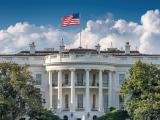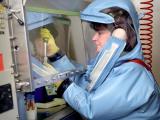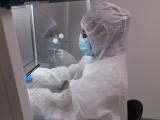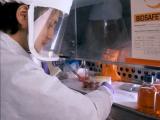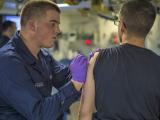Jan 19, 2005 (CIDRAP News) – A recent exercise that confronted international leaders with a hypothetical smallpox attack showed the potential for tensions between countries that have enough smallpox vaccine and those that don't, according to news reports.
In the exercise, called Atlantic Storm, about 10 current and former high-ranking US and European officials grappled with an imaginary release of smallpox virus in major cities in Germany, Poland, the Netherlands, Turkey, and the United States. The scenario had the leaders gathered at a mock Washington summit meeting at the time of the attack.
As imaginary smallpox cases mounted, so did worries over whether and how to share limited supplies of vaccine, according to media reports and a news release from the University of Pittsburgh Medical Center (UPMC) Center for Biosecurity, which cosponsored the exercise.
US health officials have repeatedly said the nation has enough smallpox vaccine for the entire population. The UPMC said Britain, France, Germany, and the Netherlands are in the same position, but Italy and Sweden could vaccinate only about 10% of their populations. The Washington Post said Canada and Japan could vaccinate only about 20% and Turkey only 1%.
In the exercise, Turkey, a NATO member, demanded immediate shipments of vaccine from its NATO partners, according to Post columnist Anne Applebaum. But former US Secretary of State Madeleine Albright, playing the role of US president, said the American public objected to sharing vaccine with countries that didn't support the United States in its war in Iraq.
The participants also argued about whether to use targeted or mass vaccination strategies and about which institution—the United Nations, the European Union, NATO, or others—should lead the global response.
A Post report by John Mintz said possibly the major lesson of the exercise was that there is "no playbook anywhere" to guide leaders on how to share supplies of vaccine or who should make such decisions.
Participants eventually agreed that the World Health Organization (WHO), part of the UN, should take the lead, according to Mintz's report. But because of pressure from US groups that distrust the UN, Albright went along with that only reluctantly.
Further, former WHO Director-General Gro Harlem Brundtland cautioned that the WHO has a budget "about as big as that of a middle-sized English hospital" and was already under strain because of the recent tsunami in Asia, according to the UPMC release.
Another contentious issue was whether it is safe to dilute smallpox vaccine by 5 to 1 to stretch supplies, the Post reported. US scientists supported dilution, but the Europeans opposed it. (Recent US clinical trials of the Dryvax vaccine showed that it remained effective when diluted 5 to 1.)
In other difficulties, the leaders begged each other not to close borders because they knew it would sow panic and cripple economies, the Post reported. But both Germany and the Netherlands did so.
In the scenario, the smallpox release ultimately led to 45,000 deaths in the United States, millions of deaths worldwide, a frozen global economy, and ethnic strife in many countries, according to the Post.
Participants concluded that the world is far from ready for a bioterrorist attack. "It was a shock how little prepared many countries were," former Dutch Interior Minister Klaas de Vries was quoted as saying.
After the exercise, many players voiced surprise that their countries had little smallpox vaccine, the UPMC said. Several agreed that governments on both sides of the Atlantic were not sufficiently aware of the risk and possible consequences of bioterrrorism.
Besides the UPMC Center for Biosecurity, sponsors of the exercise were Johns Hopkins University in Baltimore and the Transatlantic Biosecurity Network.
See also:
UPMC news release
Dec 10, 2004, CIDRAP News story, "US pledges smallpox vaccine for world stockpile"
